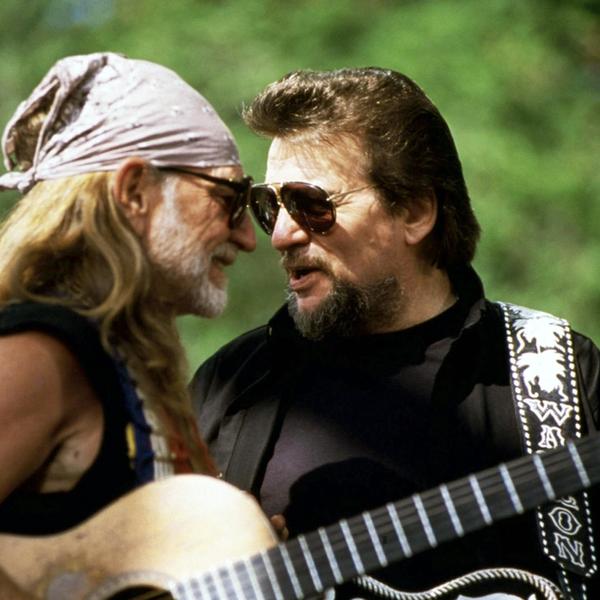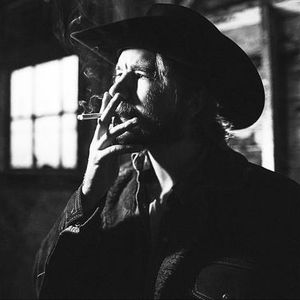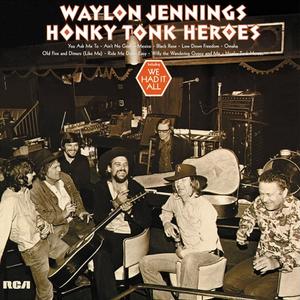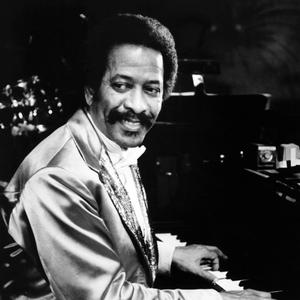




Link copied

The term outlaw country wasn't thrown about too often in the early days.
According to Jason Mellard, author of Progressive Country: How the 1970s Transformed the Texan in Popular Culture, the title came about steadily. "The term seems to have sedimented over time, rather than exploding in the national consciousness all at once," he writes.
The term was potentially coined in an article by music critic Dave Hickey, to describe artists who opposed the commercial and creative control of Nashville's recording industry. Nevertheless, it became best-known thanks to Lee Clayton's song 'Ladies Love Outlaws', sung by a certain Waylon Jennings.
While Jennings perhaps pre-empted the outlaw movement with his 1966 album Nashville Rebel, he would come into his own with 1972's Ladies Love Outlaws.
The then 35-year-old was growing weary with Nashville's restrictiveness; "They wouldn't let you do anything. You had to dress a certain way, you had to do everything a certain way," Waylon shared in an interview. "They kept trying to destroy me. I just went about my business and did things my way. You start messing with my music, I get mean."
With the influence of Neil Reshen, his new manager, Jennings rejected RCA's offer of $5000 to re-sign, ending up with $75,000 and full artistic control instead. During this time, Jennings - armed with a beard that he kept to match the new sound - spearheaded the outlaw country movement.
In 1970, the year he recorded his debut album, Kris Kristofferson told the New York Times, "People kept telling me that I'd never make it in Nashville, that I oughta' head for California or New York".
The record would come to exhibit the songwriter's growing disdain for the establishment, something that would make him a key figure in the outlaw country movement of the 1970s. Like his counterpart Jennings, Kristofferson's relationship with record executives was no smooth ride.
In their eyes, Kristofferson's music was far from the Nashville sound norms, those shaped by producers like Chet Atkins. Instead, it was raw and gritty, no-holds-barred and rebellious.
The movement was influenced more by blues, honky tonk and rockabilly than country, an offshoot from the ever-evolving rock and roll genre inspired by Elvis Presley, Buddy Holly and Hank Williams. It would become more relevant over the coming years and a notable opposition to Nashville's prestige.
In '72, Willie Nelson also turned his back on Nashville, retiring after a run of mid-chart success, packing his bags and moving to Austin, Texas. His retirement didn't last long, as he found solace in the Texas capital's burgeoning hippie music community, one more diverse than Nashville's.
His unusual fusion of country, folk and jazz influence proved a success in Austin, finding Nelson quickly back on his feet once again. After being taken under Neil Reshen's wing thanks to Jennings' introduction, the prolific manager scored Nelson quite a favourable record deal.
He became the first country artist ever to sign with Atlantic Records, joining Jennings in becoming a figurehead for the newly duped outlaw country sound, with both achieving success whilst defying the Nashville sound.
They would trade Rhinestone suits for leather jackets and stop cutting their hair as the movement developed through the 1970s. Lyrics became two fingers up to the formulaic Nashville country as artists began to blow away the cobwebs from forgotten sounds.
Southern rock bands like Lynyrd Skynyrd and The Allman Brothers Band were starting to influence the scene, while the revival of Johnny Cash's career in the 1970s was also undoubtedly thanks to the outlaw movement. He recorded two albums in notorious prisons for genuine lawbreakers while adopting a more ragged look - acquiring himself the infamous "Man in Black" nickname.
It wasn't until 1976 that outlaw country was solidified with the seminal record Wanted! The Outlaws; a compilation LP of songs from Jennings and Nelson, alongside Jessi Colter and Tompall Glaser. Ironically, the album that cemented the singers as true outlaws was the first country album ever to become platinum-certified, hitting sales over one million units.
Nevertheless, the movement's decline became evident towards the end of the 1970s. Outlaw artists would continue recording into the 80s, but it became more of a fad; the powder and pot were less prevalent in their lyricism.
While Jennings, Kristofferson, Nelson and Cash found great success in forming The Highwaymen, outlaw country's place in country folklore was already cemented. Everyone was growing up - Hank Williams Jr. was singing about his outlaw friends choosing their home lives over the unforgiving road in 1981's 'All My Rowdy Friends (Have Settled Down)'. Even Jennings eventually hung up his spurs with his hit 'Don't You Think This Outlaw Bit's Done Got Out of Hand'.
The outlaw movement had a short run; once the genre hit the mainstream, how could it still indeed be outlaw? Though there was a decline in momentum as the road-weary cowboys took a seat, a few states across the outlaw spirit existed as more than just a death rattle.
Born from deep outlaw roots, Texas was starting to brew its take on country music. Thanks to Willie Nelson's move, a new scene - unsurprisingly termed Texas country - was formed, inspiring artists like Guy Clark, Steve Earle and Townes Van Zandt. The lyrical narrative is the true backbone of Texas country, which generally followed the same themes of loss and regret, frustration, love and pride.
This newfound outlaw spirit gave birth to Pat Green (who infiltrated Nashville with his Grammy-winning Wave on Wave record), Radney Foster and Randy Rogers in the 1990s. Jack Ingram, whose influence from Texas country is paramount to his success, was prominent in the 2000s.
Even Kevin Fowler, the former Guns' n' Roses wannabe glam rocker, embodied Texas country with his record Beer, Bait and Ammo. Across state lines in Oklahoma, Red Dirt music - music made south of the Red River in Texas - took influence from 1970s outlaw country, most notably through Bob Childers, the "Father of Oklahoma Red Dirt".
Of course, the outlaw spirit didn't only develop into road-chooglin', dope-smoking, beer-fuelled Texas country. Politics-driven and anti-establishment songs exist now more than ever, truly breaking the Nashville sound - precisely what Jennings, Kristofferson and Nelson set out to accomplish. Jason Isbell's record, The Nashville Sound, is as anti-Nashville as you could get; the singer-songwriter constantly remains outspoken about his dismay for contemporary country.
Similarly, Margo Price's Music City journey hasn't ever been an easy one. Moving during hard times, she found even more difficulty breaking Nashville upon arriving. Facing rejection and a lack of support from Nashville labels, she turned her back on releasing music the 'common way'.
Instead, Jack White would pick her up and release Midwest Farmer's Daughter on Third Man Records, marking the label's first country release. Many describe Price as a "spiritual descendent" of outlaw country - hell, she even called Willie Nelson in for a duet on 'Learning to Lose'. He even let her formulate her own strain of Willie's Reserve weed.
The elusive Orville Peck, who first broke into the public with 2019's Pony, is one of country's newest outlaws. Although covered in a fringed mask to hide his true identity, his lyrics are deeply personal, contrary to what you might expect from his immaculate Nudie suits.
His influences range from the likes of Ernest Tubb - the first country artist to use an electric guitar at the Grand Ole Opry - to the theatrics of Dolly Parton and the honesty of the cosmic cowboy, Gram Parsons.
For a young man who often found himself alone growing up, the outlaw ethos holds particular importance. "I found ways to embrace it [being alone], and that's what being an outlaw is about - being on the outside of things and still keeping your head high, blazing your own trail, even if you have to do some bushwhacking in the process," he told Men's Journal.
Peck also represents the LGBTQ+ community; as he sings of falling in love with bikers, outcasts and general bad boys, he notes his struggle to relate to the country music he loved growing up.
Ultimately, the most prolific outlaw of contemporary country is Lil Nas X; an artist so against the norm that he's now a global superstar.
The rapper turned country upside down with his single 'Old Town Road', accompanied by a video in which he sports a rhinestone-adorned tassel shirt alongside Billie Ray Cyrus.
Though the single spent a mind-blowing 19 weeks at no.1, it was rejected by the Hot Country Songs chart because it did not fit the 'normal sound' of country. It would spark a long-overdue conversation about the modern definition of the genre. Lil Nas X, meanwhile, became the first openly gay black artist to win a CMA Award.
Nelson, Jennings and Kristofferson set out to change country music's future in the early 1970s. The result of their work, now some 50 years on, is still prolific in paving the way for Nashville and country music as a whole.
It was an early example of defying the norms within an ultimately very tunnel-visioned world, introducing the process of questioning the rigid structures of a music genre. Thanks to those early outlaws, country can consistently evolve and travel new channels.
Raise a bourbon for the true outlaws – their battles have shaped the music we know and love today.
~~
Subscribe and listen to Holler's Best Outlaw Country Songs Playlist below:




